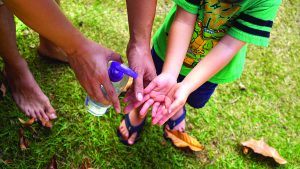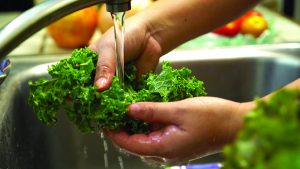In late September, an infant from Hawai’i Island was confirmed as the state’s 17th case of rat lungworm disease. Caused by a roundworm parasite, it can have debilitating effects on a person’s brain and spinal cord. The disease is endemic to the state and spreads when rodents pass larvae of the worm in their feces, which then is eaten by snails and slugs.
Rat lungworm disease cannot be spread from person-to-person. Humans become infected by accidentally consuming snails or slugs, sometimes hidden on unwashed produce. People also can get the disease from eating under-cooked snails, freshwater prawns, crabs and frogs.
The Puna toddler was infected likely after accidentally consuming a slug or snail. The Hawaii State Department of Health (DOH) is reminding parents, grandparents and caregivers to closely supervise young children, making sure they are not ingesting slugs, snails or other objects from the ground.
“As caregivers, we have to watch what children might be sucking and chewing on, and help them properly wash their hands using soap and clean water after playing, whether indoors or outdoors,” says Health Director Dr. Virginia Pressler.
Many kūpuna enjoy spending time in their backyards and gardens. To reduce the risk of rat lungworm disease, everyone is encouraged to eliminate slugs, snails and rats in their home gardens and around their properties.
Important safety tips include:
- Carefully wash produce un-der potable running water, especially leafy greens, to remove any tiny slugs or snails.
- Cook food thoroughly by boiling for 3 to 5 minutes or heating to 165 degrees Fahrenheit for 15 seconds.
- Cover water catchment tanks and containers.
- Place a nozzle on watering hoses and keep off the ground to prevent slugs and snails from entering.


SYMPTOMS:
See your doctor if you have severe headache, neck stiffness, fever, tingling or pain in the skin or extremities.
HAWAI‘I STATE DEPARTMENT OF HEALTH
Disease Investigation Branch
808-586-8362 | Info Line 808-586-4400
www.health.hawaii.gov


Leave a Reply